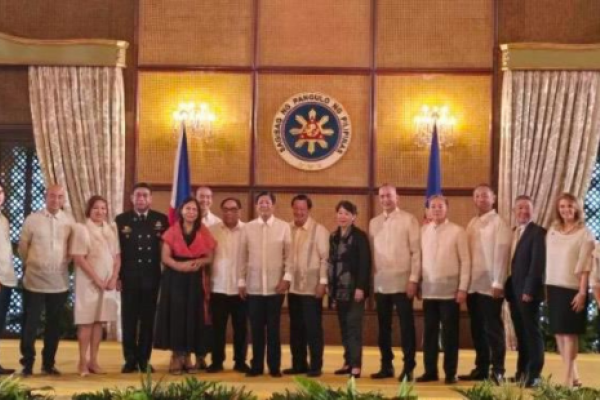
Tony Nicholson
Published: October 10, 2024
Following a lengthy legislative process, The Magna Carta of Filipino Seafarers was signed by President Marcos on 23rd September 2024 and published on the Official Gazette site of the Philippine Government on 25th September.
This new law, designed to elevate the status of the Philippines longstanding seafaring tradition, will become effective from Friday, 11th October 2024.
What happens next?
Once the law takes effect on 11th October 2024, the DMW (Department of Migrant Workers) will have a further 90 days to finalise the Implementing Rules and Regulations (IRR), the purpose of which is to assist with the implementation of The Magna Carta of Filipino Seafarers. The importance of the IRR cannot be understated, and we will continue to monitor closely, providing updates of material developments as they become known. However, the law has effect from 11th October.
We anticipate there will continue to be an ongoing consultative process with all interested stakeholders, including the International Advisory Committee on Global Maritime Affairs, composed of the European Community Shipowners’ Association, the International Chamber of Shipping, the International Transport Workers’ Federation (ITF), and the International Maritime Employers’ Council, formed by the DMW at the direction of President Marcos, in January 2023.
What is the purpose of this new law?
The Magna Carta is designed to elevate the protection and opportunities for Filipino seafarers at every level, from the beginning of their career through to retirement, by aligning domestic legislation with international conventions.
This new law has also sought to find an equitable solution to longstanding domestic and international concerns highlighting the unique challenges posed by the existing legal framework specific to the handling and resolution of Filipino crew claims, and the significant impact this presently has on both Filipino seafarers and their employers alike.
Garnishment (Enforcement of the NLRC or NCMB’s decision) and Legal Fees charged by Complainant lawyers
Sec. 59. Execution of Judgement and Monetary Awards seeks to equitably address concerns which could threaten the Philippines status as a leading supplier of labour to the world’s merchant fleet. These concerns are two-fold, and arise from the enforcement of the NLRC’s (National Labor Relations Commission) and NCMB’s (National Conciliation and Mediation Board) decisions, before they have been subject to review by the Court of Appeals, and potentially the Supreme Court; and the role of Complainant lawyers in the pursuit of such claims, often to the detriment of the seafarer, or their successors-in-interest.
Equally important to addressing concerns regarding the practices of Complainant lawyers, is that Sec. 59. and Sec. 60. (Prohibition on Appearance and Fees), reinforce the “Seafarers Protection Act” / Republic Act #10706, which came into force in 2015, by placing a stipulation on fees Complainant lawyers can receive to an amount not exceeding 10% of the compensation which may be awarded to the seafarer.
Sections of specific interest to Members
Sec. 51. Insurance Coverage
This Section incorporates the provisions of the Amended Migrant Workers Act (AMWA) which came into force in 2010, specific to the compulsory insurance requirements arising therein.
Whilst it is anticipated implementation will mirror what was witnessed in 2010, providing Manning Agents with the option to procure a policy issued by domestic insurers registered with the Philippine Insurance Commission, or provide a Certificate of Cover on the letterhead of their POEA accredited Principal, the IRR to be finalised will ultimately define the associated requirements.
The links below provide background information that may be of interest concerning the AMWA and requirements specific to the compulsory insurance provisions in 2010.
Microsoft Word - L.126-Migrant Workers.doc
Microsoft Word - L.139-The Migrant Workers and Overseas Filipinos Act Of 1995.doc
Microsoft Word - L 144 -Introduction of the compulsory Insurance provisions of the migrant workers and overseas Filipnos act of
Sec. 57. Determination of Disability Grading or Fitness to Work
Importantly, the DMW and the DoH (Department of Health), are required to develop joint guidelines for the implementation of this section, “….including the selection, training, maintenance, and review of the pool of accredited third doctors.” It is presently unclear if the joint guidelines have been drafted. It is assumed these guidelines will form the basis for the associated provisions to be contained in the IRR to be finalised within 90 days of the law taking effect on 11th October.
Currently, the process of appointing a third doctor is mandatory before any claim may be filed, although the issues resolved by a third doctor are limited to the final disability grading, or the fitness of the seafarer to work. A third doctor does not determine whether a condition is work or non-work related.
Under Sec. 57., if a doctor of the seafarer’s choosing issues a disability grading contrary to the findings of the company-designated physician, the seafarer must file, “within 30 days from receipt of the findings of the seafarer’s doctor” a written request with the DMW to refer the conflicting opinions to a third doctor.
Difficulties in instructing, or agreeing on the appointment of a third doctor will be well-known to anyone with experience of handling Filipino crew claims, and it remains to be seen how the requirement to establish a pool of DoH accredited third doctors, with a wide range of expertise in different medical disciplines, will be satisfied.
Sec. 59. Execution of Judgement and Monetary Awards
It’s worth emphasising that amid shared concerns regarding how Filipino crew claims are resolved, the position now outlined within Sec. 59. has been supported by the ITF and leading Unions in the Philippines, including Associated Marine Officers’ and Seamen’s Union of the Philippines (AMOSUP).
This section requires the Department of Labor & Employment; the NLRC and NCMB, in consultation with the Maritime Industry Tripartite Council and the DMW, to “promulgate the necessary rules and procedures to ensure the fair, equitable, and just disposition and execution of decisions granting monetary awards for the salaries, wages, statutory benefits, and the death and disability claims of seafarers.”
This section also mandates that such rules and procedures “shall institute mechanisms for the prevention of ambulance chasing” and the “prosecution or disbarment of ambulance chasers.”
Specifically, this section provides for the following [emphasis applied]………..
The decision granting a monetary award in voluntary or mandatory arbitration, or by the NLRC, must state the specific amounts for the payment of the following:
a. Any salary or wage;
b. Any statutory monetary and welfare benefits;
c. Any undisputed amount, which is admitted by a party to be legally due to the other party;
d. Any disputed amount determined to legally due the seafarer; and
e. Damages, including moral damages, exemplary damages, nominal damages; attorney’s fees, and other similar awards;
The portion of the decision awarding items (a), (b), or (c) above shall be immediately executory even pending appeal or judicial review.
Pending an appeal or judicial review, a writ of execution on items (d) and/or (e) shall only be issued if the judgement oblige posts a sufficient bond to ensure the full restitution of those amount and the bond shall be maintained by the oblige until final resolution of the appeal or judicial review: Provided, That in the event the seafarer ultimately prevails on appeal or judicial review, the losing party shall immediately reimburse the total amount paid by the seafarer for the cost of the bond. However, if the seafarer loses, no such reimbursement shall be made.
Importantly, the DMW may provide financial assistance to the seafarer depending on the final determination of maritime disability grading under Section 57, for the payment of premiums of the bond, either in full or part.
Club and local correspondents
We presently wait to understand whether Sec. 59. will have retroactive effect with regards to cases pending before the NLRC or NCMB, which have yet to see their decision enforced. We would therefore strongly recommend Member’s with active cases pending before the NLRC or NCMB consult with their claims contact at the Club and retained correspondents for advice / guidance.
Link provided to Del Rosario’s Q&A.


